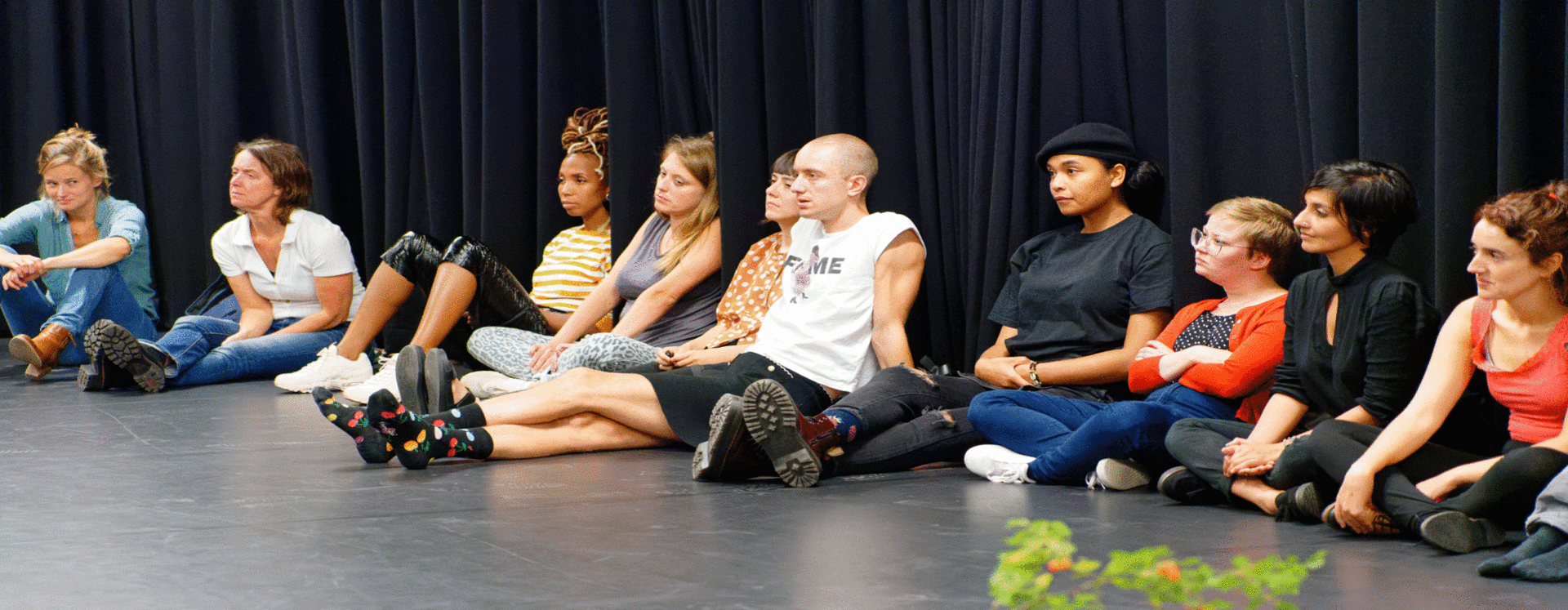Image: Sketch for exploring Zatar, Photograph, Collage on paper, 2022. Credit: Samah Hijawi
Leanne Betasamosake Simpson in dialogue with guests Samah Hijawi and Yazan Khalili moderated by Sara Giannini
Leanne Betasamosake Simpson is a renowned Michi Saagiig Nishnaabeg writer, musician, academic and activist who has been widely recognized as one of the most compelling Indigenous voices of her generation. As part of her artist in residence program at the Academy of Theatre and Dance Amsterdam, Leanne invites us to join her in dialogue with the practices of Palestinian artists Samah Hijawi and Yazan Khalili. Moderated by Sara Giannini, Leanne, Samah and Yazan will offer short sharings of their artistic practices before opening out into a conversation with Leanne around art, indigenous and Palestinian struggle and solidarity.
Leanne Betasamosake Simpson is a renowned Michi Saagiig Nishnaabeg writer, musician, academic and activist who has been widely recognized as one of the most compelling Indigenous voices of her generation. Her work breaks open the intersections between politics, story and song—bringing audiences into a rich and layered world of sound, light, and sovereign creativity. She is a status member of Alderville First Nation in Ontario, Canada. Leanne is the author of eight previous books, including As We Have Always Done (2017) and Dancing on Our Turtle’s Back. Her novel Noopiming: The Cure for White Ladies, which was short-listed for the Dublin Literary Prize and the Governor General’s prize for fiction. Her latest project in collaboration with Robyn Maynard, Rehearsals for Living was short-listed for the Governor Generals prize for non-fiction and is a national best seller. Leanne’s album Theory of Ice was short- listed for the Polaris Prize and she was the recipient of the Prism Prize’s Willie Dunn award for innovation in video production. Working for two decades as an independent scholar using Nishnaabeg intellectual practices, Leanne has lectured and taught extensively at universities nationally and internationally and has twenty years experience with Indigenous land based education. She holds a PhD from the University of Manitoba.
Samah Hijawi is a multimedia artist, writer and astrologer. Her projects are deeply rooted in historical narratives which are used to re-imagine our contemporary life beyond the radicalized and polarized discourses that direct our lives today. In her recent project Kitchen. Table., she researches the histories and cosmologies of the food on our tables. She recently completed a PhD in Art Practice titled Chicken Scribbles and the Dove that Looks Like a Frog, where she explored deconstructing colonial representations of Palestine through performance and collage. This gave birth to a curated and pedagogical project titled Aesthetics of the Political, that explored how artists materialise their political ideas and positions into aesthetic form. In her past life, she collaborated with Ola El-Khalidi and Diala Khasawneh in directing Makan (2003-2016), an independent space for contemporary art in Amman, Jordan. And together with Shuruq Harb and Toleen Touq she co-curated the platform The River has Two Banks (2012-2017), initiated to address the distances and proximities between Jordan and Palestine. In 2023, she joined as a tutor of DAS Theatre at the Academy of Theatre and Dance, Amsterdam.
Yazan Khalili (1981) is an architect, visual artist, and cultural activist who lives and works in and out of Palestine, currently based in Amsterdam, Netherlands, where he is a PhD candidate at Amsterdam School for Cultural Analysis (ASCA), University of Amsterdam. In 2019 he co-founded The Question of Funding collective, and in 2020 he co-founded Radio Alhara. Using photography and the written word, Khalili unpacks historically constructed landscapes. Borrowing from cinematic language, images become frames where the spectator embodies the progression of time and narratives. He weaves together parallel stories over the years, forming both questions and paradoxes concerning scenery and the act of gazing, all of which are refracted through the prism of intimate politics and alienating poetics. In particular, he focuses on the effect of geographical distance on our rendering of territory, and its ability to heighten or arrest our political and sentimental attachments.
His works have been exhibited in several major exhibitions, including among others: Documenta fifteen 2022, KW, Berlin 2020, MoCA Toronto 2020, New Photography, MoMA 2018, Jerusalem Lives, Palestinian Museum, 2017, Post-Peace, Kunstverein Stuttgart 2017, Shanghai Biennial 2016, Sharjah Biennial 2013.
Sara Giannini is a curator, writer and educator based in Amsterdam. After studying theatre and semiotics in Italy, her birth country, she grew an interest in the interplays between language and performativity as tools of critical fabulations within different artistic practices. This somehow led her to contemporary art and to becoming a curator who rarely makes exhibitions. Since 2019 she is program curator with the arts organisation If I Can’t Dance, I Don’t Want to Be Part of Your Revolution, Amsterdam, where she develops art and research commissions exploring the expansive field of performance and performativity. Prior to her engagement with If I Can’t Dance, she worked for the Global Art and the Museum programme at the ZKM | Karlsruhe on a range of editorial and curatorial projects investigating the impact of globalization on the art world (2010–2013). As an independent curator, she has initiated long-term collaborative projects such as the VOLUME project (2013-14), a collective inquiry on the library led with 98weeks, Beirut, the web-publishing platform Unfold (since 2015), and Heterotropics (2018-19), a series of interventions on the traces of colonial history in the urban and cultural fabric of Amsterdam.


